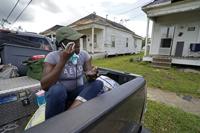It was one of those moments that in hindsight Lake Charles Mayor Nic Hunter wishes he would have knocked on wood and spit three times as he said on Aug. 19: “We’ll be in decent in shape unless a hurricane hits us.”
Hunter had joined other mayors imploring the U.S. Congress to cease its bickering and agree on financial aid to help local governments overcome a significant drop in revenues after many businesses closed to mitigate the spread of the highly infectious coronavirus. Hunter, like other Louisiana mayors, was forced to tap the city’s disaster fund to cover the cost of law enforcement, sanitation and other services.
A little more than a week later on Aug. 27, Hurricane Laura came ashore 30 miles south of Lake Charles with 150 mile-per-hour winds.
“It shows that COVID has been a struggle, an epic struggle, for municipalities,” Hunter said Thursday. “But it doesn’t mean other struggles took a vacation. We’re seeing that right now in Lake Charles. We’re sandwiched between two epic struggles. … The struggle is very real in Lake Charles.”
+3

In aftermath of Hurricane Laura, some Lake Charles residents worry about help, feel alone
LAKE CHARLES — In a matter of hours last week, Hurricane Laura tore through the tire shop Layla Winbush’s family started just under a year ag…
Louisiana’s congressional delegation is attempting to reduce the local match for Federal Emergency Management Agency hurricane recovery money from 25% put up by affected towns and cities to 10%, a level that municipalities will still struggle to meet because much of their money earmarked for that purpose had been spent to cover expenses once paid by tax revenues that were no longer available after COVID-19.
Any financial help from Congress, at least concerning coronavirus relief, likely won’t come until after the Nov. 3 elections, said John Gallagher, executive director of the Louisiana Municipal Association, which lobbies government for villages, towns, and cities. As Gallagher spoke Thursday, he was in Lake Charles looking at destroyed buildings with no power three weeks after Laura’s eye passed over the homes of about 81,000 people, most of whom are stuck in hotels and shelters hundreds of miles away.
The U.S. Senate on Tuesday unsuccessfully pushed a Republican coronavirus stimulus bill that Democrats called “skinny” and “emaciated.” Republicans wanted $500 billion to $700 billion — nothing for local governments. Democrats backed a U.S. House-passed bill seeking $2.2 trillion in coronavirus relief, including more than $900 million for state and local governments.
In a tweet Wednesday, President Donald Trump urged fellow Republicans on Capitol Hill “to go for the much higher numbers.”
U.S. Sen. Bill Cassidy, R-Baton Rouge, wanted, but could not attach, language giving (with some strings) $500 billion to local governments.
At the time Cassidy said in a statement: “State and local aid seems to be a main sticking point in negotiations.” At $500 million, Cassidy’s SMART Act, S. 3572, is about halfway between the numbers Democrats and Republicans seek.
Many Republicans are against sending money to local governments, arguing that the money might be spent on unrelated expenses rather than shoring up vital services. In the words of U.S. Sen. John N. Kennedy, R-Madisonville: “It’s not the federal government’s job to bail out local and state officials who spent recklessly” in the past.
Come Thursday, Cassidy had joined the partisan bandwagon, at least rhetorically, on the reasons why Congress couldn’t pass a stimulus package that also includes funding for increased unemployment benefits.
“There is the cynical view that they feel the president is in a bad way politically and somehow they could hold out and get more,” Cassidy said of Democrats in a news conference. “I hope that’s not the case. That would be leveraging the pain of the American people; the pain of those unemployed; the pain of those terribly affected by the economic lockdown related to COVID; using their pain to leverage for political advantage.”
That Cassidy would blame Democrats shouldn’t come as much of a surprise. He is up for reelection Nov. 3 and faces 14 challengers, including Shreveport Mayor Adrian Perkins. His candidacy has attracted endorsements from around the country, including former presidential candidates Elizabeth Warren, Corey Booker and Pete Buttigieg.
Senate Republicans, who hold a majority, are defending 23 of their 53 seats on Nov. 3. Democrats have only 12 seats up for reelection. Republican senators see going home to campaign for the remaining 44 days as a better use of their time.
But before they go, Congress needs to pass a temporary spending measure to keep the federal government open after Sept. 30, which won’t be easy.
+38

After Hurricane Laura, here’s why many are staying, holding onto memories amid the damage
LAKE CHARLES — If there were ever any novelty in living without air conditioning during a sweltering September, fighting off mosquitoes inside…
All of which underscores the personal opinion of the LMA’s Gallagher that financial help for Louisiana municipalities won’t be coming anytime soon.
Lake Charles will soldier on, said Mayor Hunter, a Republican.
“It’s concerning any time you have such a stalemate in Congress,” Hunter said. “But you got to keep rolling with punches.”
